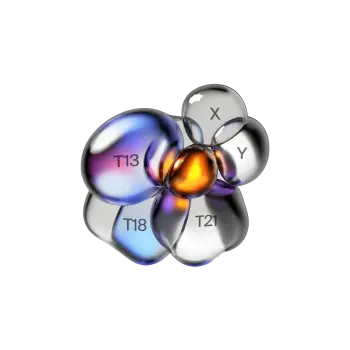Chromosome 13 is one of the 23 pairs of chromosomes found in human cells. It contains approximately 114 million base pairs and accounts for about 3.5% of all DNA in cells. Chromosome 13 has over 300 genes that are essential for human development and various bodily functions.
An important genetic abnormality associated with chromosome 13 is Trisomy 13, also known as Patau syndrome, which occurs when an individual has three copies of chromosome 13 instead of two. This leads to physical and cognitive developmental problems. Patau syndrome is often identified through prenatal tests, such as NIPT (Non-Invasive Prenatal Testing).
According to the National Institutes of Health (NIH), Trisomy 13 occurs in approximately 1 in 10,000 live births. This chromosomal abnormality is most often the result of a random event during the formation of eggs or sperm.
Symptoms of Trisomy 13
Symptoms of Trisomy 13 can vary but often include:
- Severe heart defects
- Brain abnormalities
- Extra fingers or toes (polydactyly)
- Cleft lip and palate
- Low birth weight
- Feeding and breathing difficulties
Diagnosis of Trisomy 13
Trisomy 13 can be diagnosed through several methods:
Prenatal Testing
- NIPT: A commonly used blood test performed early in pregnancy where the mother’s blood sample is analyzed to detect fetal DNA and identify trisomies, including Trisomy 13. Other methods for identification or diagnosis include:
- Ultrasound: Can detect certain physical signs of Trisomy 13.
- Amniocentesis: A sample of amniotic fluid can be taken to identify chromosomal abnormalities.
- Chorionic Villus Sampling (CVS): A sample from the placenta can be taken to analyze the fetus's chromosomes.
Postnatal Testing
After birth, the diagnosis can be confirmed through a blood test that analyzes the baby’s chromosomes.
Management and Treatment
There is no cure for Trisomy 13, but there are various ways to manage the symptoms:
- Surgery: May be required to correct heart defects or other physical abnormalities.
- Medications: Can be used to manage specific symptoms such as seizures or infections.
- Physical therapy: To improve motor skills.
- Nutritional counseling: To ensure adequate nutritional intake.
- Palliative care: To improve the quality of life for children with severe symptoms.
Receiving a diagnosis of Trisomy 13 can be overwhelming, making it important to seek both emotional and practical support. Many parents find comfort in joining support groups where they can share experiences and receive advice from other families in similar situations. Additionally, medical advisors can provide valuable information about the causes of Trisomy 13 and help families understand the risks for future pregnancies.






















